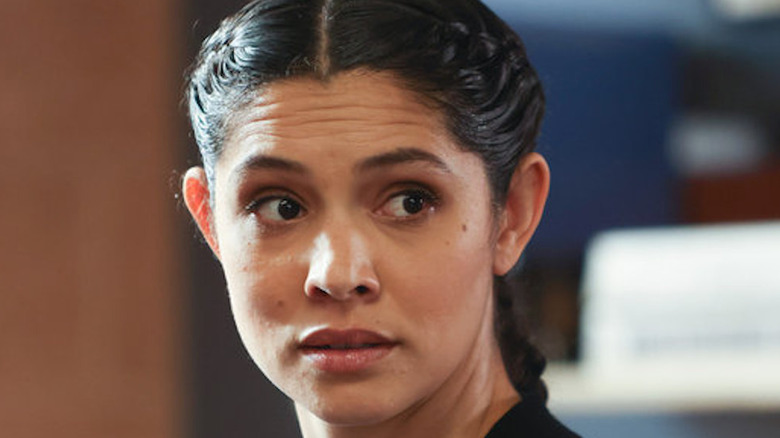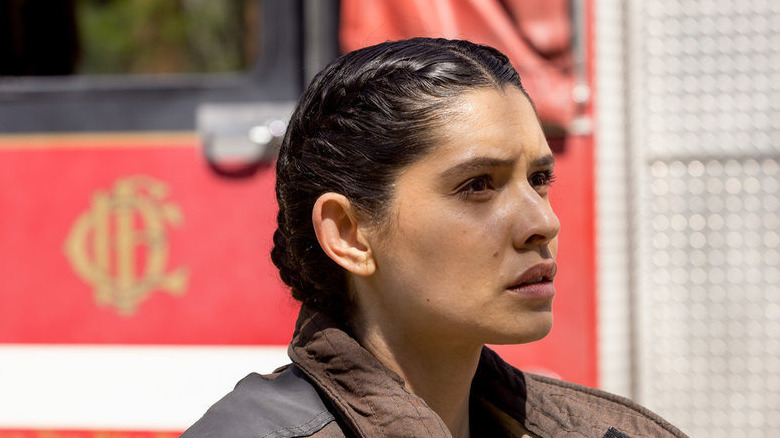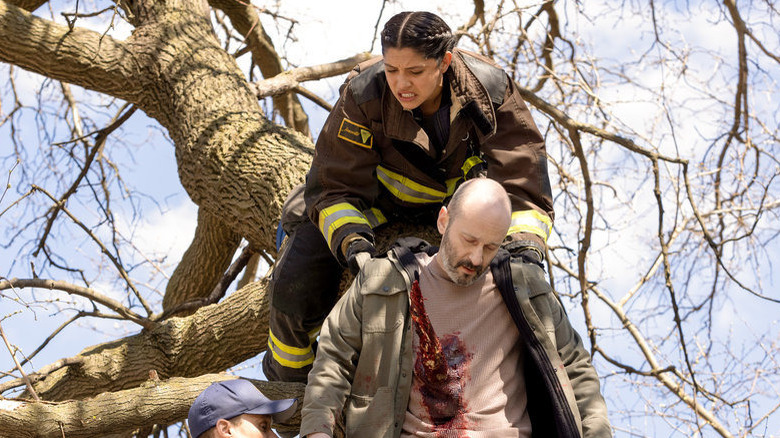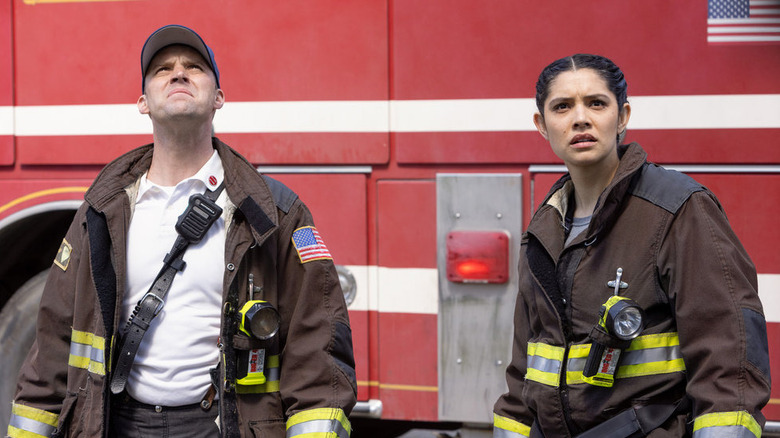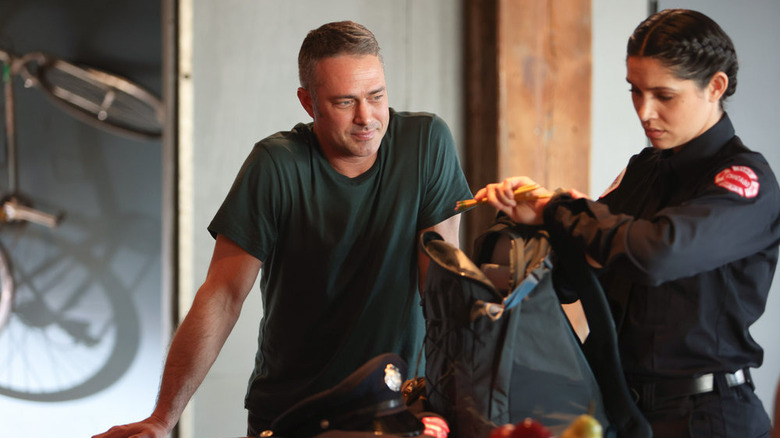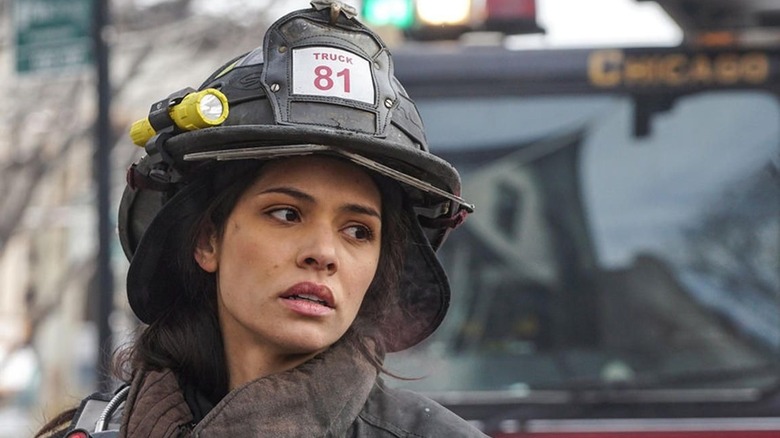Chicago Fire's Miranda Rae Mayo Gets Honest About Life Behind The Scenes - Exclusive Interview
When people think of shared universes in the entertainment space, their minds often go to the likes of the Marvel Cinematic Universe or television's Arrowverse. There's one such entity, however, in which the heroes don't have super powers or wacky costumes, and yet it's proven an incredibly successful effort at bridging multiple properties. The shared universe in question is "One Chicago," following the exploits of first responders across various disciplines in a fictional take on the midwestern metropolis.
The flagship "One Chicago" series is "Chicago Fire," which kicked off in October of 2012. Actor Miranda Rae Mayo wasn't part of the show's cast when it launched, but her Stella Kidd has become an integral character since hopping on board with the CFD in the fourth season, not to mention a member of one of the show's most fan-followed relationships thanks to her romantic involvement with cast mainstay Kelly Severide.
With "Chicago Fire" now working through its ninth season, Kidd has reached a pivotal point in her career. We took that opportunity to talk to Mayo about what it's like to work on the show, her turn in the Kidd-focused episode "Don't Hang Up," and being a part of the "One Chicago" experience.
Miranda Rae Mayo reflects on joining Chicago Fire and Kidd's journey
How do you feel about where Kidd is as a character now, and your work on this show now that you're five years in?
I'm kind of blown away at just how this is the first time ever that she has had such a prominent storyline, and that it's really all about her and her world, and it hasn't been directly connected to Severide. Severide has been kind of the supporting character. That's really fun to watch and to experience. I'm just seeing her develop into this leader by way of encouragement. It has really been a lot of fun to play with and to act out.
How would you draw the parallel between the character's journey and yours coming in as the new addition in Season 4, when there was an already-established crew?
I think that, in both cases, the crew was so loving and warm, and welcoming, and really wanted me to succeed. That's also what we saw onscreen with Stella Kidd's character is that, from the jump, there was the support of Dawson's character. Since Dawson was supportive, everybody else hopped on board and was very quick to embrace her. That's very much how my experience was off-camera. The people who really welcomed me the most were Uri, who played Otis, and David Eigenberg, who played Herrmann. And Brett. They were very warm and, "Come in, meet the family, meet my family, come over for dinner."
But I think that, when doing a show and pushing characters who live in the culture of the CFD, it's hard not to exude that, because that's very much how firefighters are. It's all about family, it's all about helping people and the community. It's been a great team to be a part of.
The technical challenges of Chicago Fire
Were there specific things about that aspect of the show, the CFD, you're portraying firefighters part of the show that the cast was able to help you with when you were starting out?
For sure. So, first of all, our technical advisor Steve Chikerotis, he was part of the main core foundation of the show. There really wouldn't be a show without Steve Chikerotis. He was a part of the first conversations that Derek Haas and Michael Brandt were having, when they wanted to create this show. When I first was cast, I want to say it was the second thing I did when I came here was have a session with Chik. He's always on set, he's always around, giving us insight about, "This is how you would be feeling." He gives us access to different firehouses and resources. He is a legitimate rock star in the firefighting community and not just in Chicago, but he travels all over to speak at conferences and teach about leadership.
So, having Chik and then Tony Ferraris — he drives the squad on the show, he's a working firefighter — having him as a part of the crew, he's always there telling us how things would normally go down. A lot of times, it's not going to match perfectly because it is a television show, there's got to be some creative license and just the technicalities of having cameras involved in safety and all that. But working with those two men specifically, and then all of their teams, numerous FSOs, fire safety officers all over that to help keep us safe. They're very warm and open if we have any questions.
Was there any part of that training that you found particularly challenging?
I mean, it's all physically challenging.
Right, but in the most recent episode, there's a scene in which you've got a guy who's impaled by a tree branch and having that be part of your day to day working experience ... is that something that struck you, when you were starting work on this show?
No, I mean, I feel like I've just been more curious, if that makes sense, just about the process of how people operate in this profession. I think maybe the most challenging part for me, or one of the more challenging parts is, I'm a very ... I love to talk about the process with other people. It's the archetype of an actor, "Let's talk about our feelings, let's talk about our process, let's be in this together." And that is the antithesis of the culture of the people who work in the CFD that I've met. It's very much like, "Holy s***, that was up f***ed up. All right, moving on. Let's make a joke about it." Because you have to be able to keep going. And it's been a learning curve.
'Don't Hang Up' as a turning point for Stella Kidd on Chicago Fire
In that same most recent episode, "Don't Hang Up," you spent a lot of that episode acting with a phone. Can you get into what that's like, and how you dealt with the particular challenges that presents?
So, from the very start, the actress who was on the other line, she was phenomenal and she was actually in the room with me. She was on the other side of a wall, so I couldn't see her, but I could hear her. And honestly that's really what that episode, those moments were all about. It was about listening and being very present.
As an actor, I was really nervous about it and really excited all at the same time. But my biggest thing was, I didn't want to show anything on my face. I didn't want to show the audience what I was feeling. I just wanted to feel it. I just wanted to be present with her in that space. So it was a great challenge and I learned a lot. Even watching it later, I learned so much.
Were there any wrinkles to that in terms of, you may have felt doing it a certain way as an actor, but then your technical consultants were coming in and saying, "Well, as a firefighter, as someone who's a professional in this position, you would handle it differently?"
Not for this, no. Honestly, personally, one of the things that I kind of struggled against and had a really hard time with was, I wanted to be more urgent, more upset. "We've got to go, we've got to help this girl right away," Some of the feedback that I got was, "You've got it, she is a first responder." This message comes out of nowhere. There's got to be a sense of rationality behind what she's doing. Her whole thing is to keep calm and to not get emotional so she can help. I was kind of worried about coming off cold. I think that Stella, especially in her wanting to become a Lieutenant and to be trusted as a leader, there's something about keeping your emotions in check so that you can help. At the same time, she finds out that this is one of her Girls on Fire, and then the stakes become much higher.
Why do you think that moment is such a linchpin for Stella as she moves toward her Lieutenant test?
I think because she, up until this point, really has been feeding off of the observations of her superiors. I think that being Lieutenant is something that she has thought about, but never in a very serious way where that's what she has been actively pursuing. It's not until Boden kind of takes her off to the side and is like, "Hey, you can do this, right?" Then she really starts to believe that it's possible, because he sees it in her. I think that this is a turning point for her because she proved that to herself, that she is that thing that they see in her. It's not just something that they're imagining; she really proved that to herself.
Miranda Rae Mayo on Stellaride and being a part of a fan-favorite ship
Have you had any experience interacting with fans around the "Severide" ship? Does it add pressure to working on that relationship, how you perform it or how the writers deal with it or how it's done on the show, because you know that there are, there is this fan movement around it?
It's interesting. I think that the reason why there is so much movement around the relationship is, there's just a lot of presence in the moment. When we do those scenes, I learn a lot from working with Taylor. He is an incredible ... he is so present and so skilled. I think that it's been a lot of fun to see the fans react so positively. I'd actually be curious to see what the experience would be like being in a relationship where the fans hate it, because either way, it's a lot of energy. Which to me means that something is resonating with people, which is exciting. I'd be super-curious about what the experience would be like, being in a ship where people hate it. I feel like it might be even more fun.
Is that fan energy something you think about when you're on set, or when you're filming a scene?
Absolutely. I don't know. It's almost like Christmas shopping for a person, and you're like, "Oh, my God. I cannot wait to see their face when they open this".
One Chicago and Miranda Rae Mayo's dream crossover
What's it been like working on the "One Chicago" universe, and filming across multiple shows?
Honestly, I've only really worked on "Med" and I think I was on "P.D." once. It's interesting. It's kind of like visiting different cities in the U.S., where it's all Americans, but New York has a certain pace and Nashville has a certain pace. It's all in the same country, we speak the same language, we're governed by the same laws for the most part. We're all in the same world, but each set feels different. The culture is a little bit different and it's kind of funny. I've been to a dinner party where most of the people there were from "Med." They are very cerebral and serene, and the energy feels very similar to their show and their set. Whereas, at a "Fire" party back in the day, it was like, we're loud and we're making jokes, and jumping up and throwing things. And it's a lot rowdier, which makes sense — we're firefighters, we're breaking things, we're very physical, very visceral.
Do those differences affect how you perform when you're on the set of that different show?
Me personally, yes. The story that I make up is that it just has more to do with me kind of owning my space and my process. The story that I make up in my head, the more hours I get on the job, the way that I perform will be impacted less and less. I'll be able to show up more consistently and not be so affected by my environment. But as of now, yes, acclimating is very much important to me, and finding where I fit in.
What would you characterize as your dream crossover scenario for Stella Kidd?
I think the dopest would be if they called and needed some type of an expert opinion on "SVU," if there was a case on "SVU" and they needed to speak to an officer who has very specific knowledge. I've never thought about it before, but that's the first thing that comes to mind. I want to go see Mariska.
"Chicago Fire" airs Wednesdays 9/8c on NBC.
